- Barajar
ActivarDesactivar
- Alphabetizar
ActivarDesactivar
- Frente Primero
ActivarDesactivar
- Ambos lados
ActivarDesactivar
- Leer
ActivarDesactivar
Leyendo...
Cómo estudiar sus tarjetas
Teclas de Derecha/Izquierda: Navegar entre tarjetas.tecla derechatecla izquierda
Teclas Arriba/Abajo: Colvea la carta entre frente y dorso.tecla abajotecla arriba
Tecla H: Muestra pista (3er lado).tecla h
Tecla N: Lea el texto en voz.tecla n
![]()
Boton play
![]()
Boton play
![]()
20 Cartas en este set
- Frente
- Atrás
- 3er lado (pista)
|
Simple tense: present and past
|
simple tenses do not normally have an auxiliary verb in affrimative sentence. Use do/does/did in an auxiliary is needes.
|
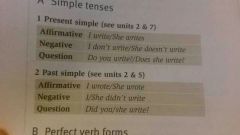
|
|
Perfect verb forms
|
present: have/has + past participle
past: had + past participle future: will + past participle |
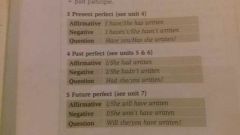
|
|
Continuous (progressive)
|
be + verb+ ing
present: am/is + verb + ing past: have/has + verb + ing |
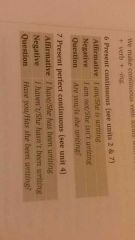
|
|
Continuous (progressive)
|
be+ verb+ ing
past continuous: was/were+ verb + ing past perfect continuous: had been+ verb + ing Future continuous: will be + verb + ing |
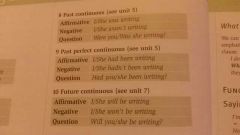
|
|
Modal verbs
|
nine ( will, would, can, could, shall, should, may, might, must)
follow by an infinitive without to ( have to, need to, etc) |
|
|
Subject questions
|
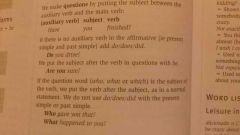
|
|
|
What clauses
|
more emphatic
|
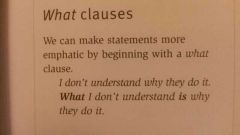
|
|
Present habit (what)
|
actions that are repeated regularly over a log period of time
|
|
|
Present habit (frequency)
|
Simple present used with adverbs ( usually, sometimes, once a week)
|
A fox COMES into our garden ALMOST EVERY NIGHT.
|
|
Present habits (predictable or characteristics behaviour)
|
will/won't+ infintive
|
A hungry fox WILL ATTACK pet rabbits
|
|
Present habits (repeated behaviour (negative))
|
keep +verb+ ing
|
If your newspaper KEEPS PUBLISHING this type of journalism, tou will lose loyak readers.
|
|
Present habits (exaggerate or complain)
|
present continuous + always/forever/constantly
|
The gutter press IS FOREVER FILLING its pages with sensationalist stories.
|
|
Past habits ( past habits)
|
used to + infinitive and would+ infinitive to talk about past habits
|
EVERY NIGHT he and his dog SAT down to dinner together.
|
|
Past habit (past states qnd habitual past actions)
|
used to + infinitive
|
Each dog USED TO HAVE its own personal servant.
|
|
Past habit (habitual past habits)
|
would + infinitive
|
He WOULD DRIVE in his carriage with half a dozen dogs inside.
|
|
Past habit ( states)
|
We cannot use would + infinitive to talk about states.
|
Adolphus Cooke a firm believer in reincarnation.
|
|
Be/ Get used to
|
be+used to= situations or actions that are already familiar.
be+get used= they are becoming familiar with the new situation. |
|
|
Defining & non-defining relative clauses
|
Give information about a noun.
|
|
|
Defining & non-defining relative clauses
|
that, who, wich (people and things)
whose (her, his, their, etc) when, where (time and place) |
|
|
Participle clauses
|
present participle (ing)
past participle (ed) |
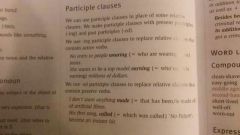
|